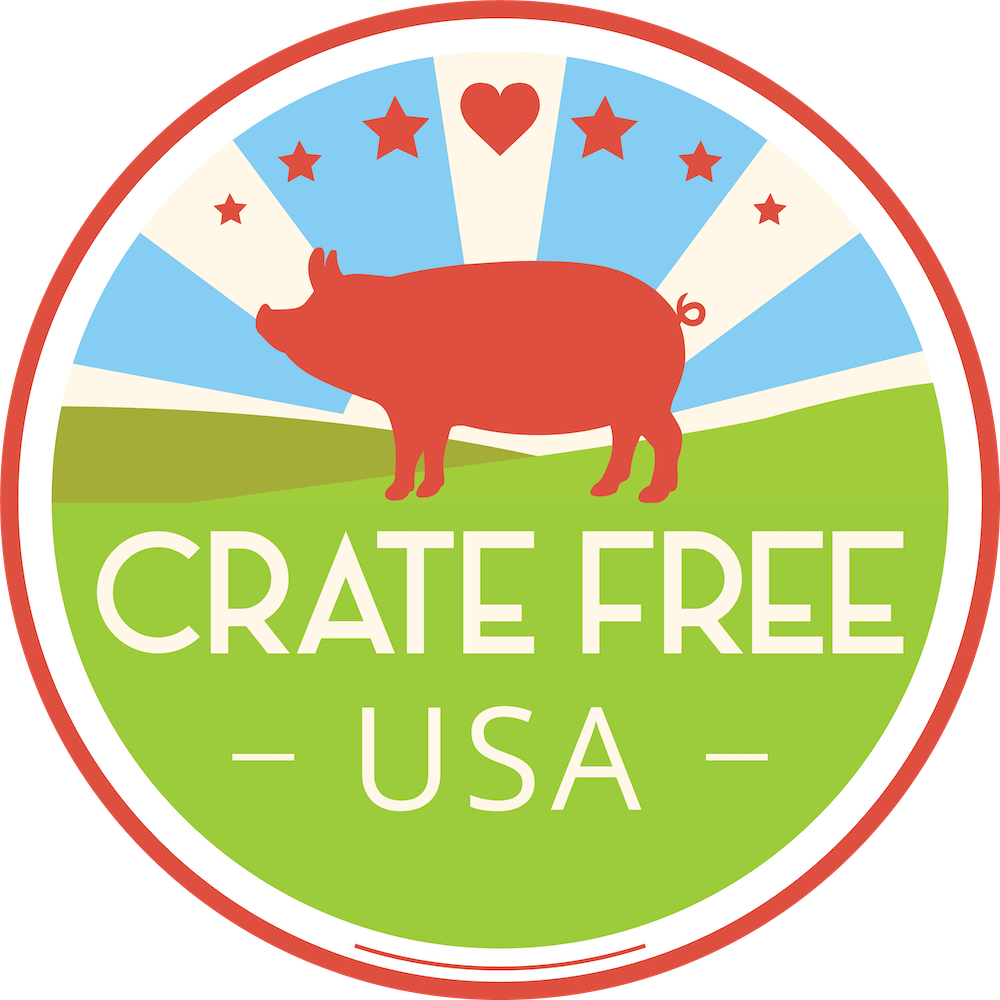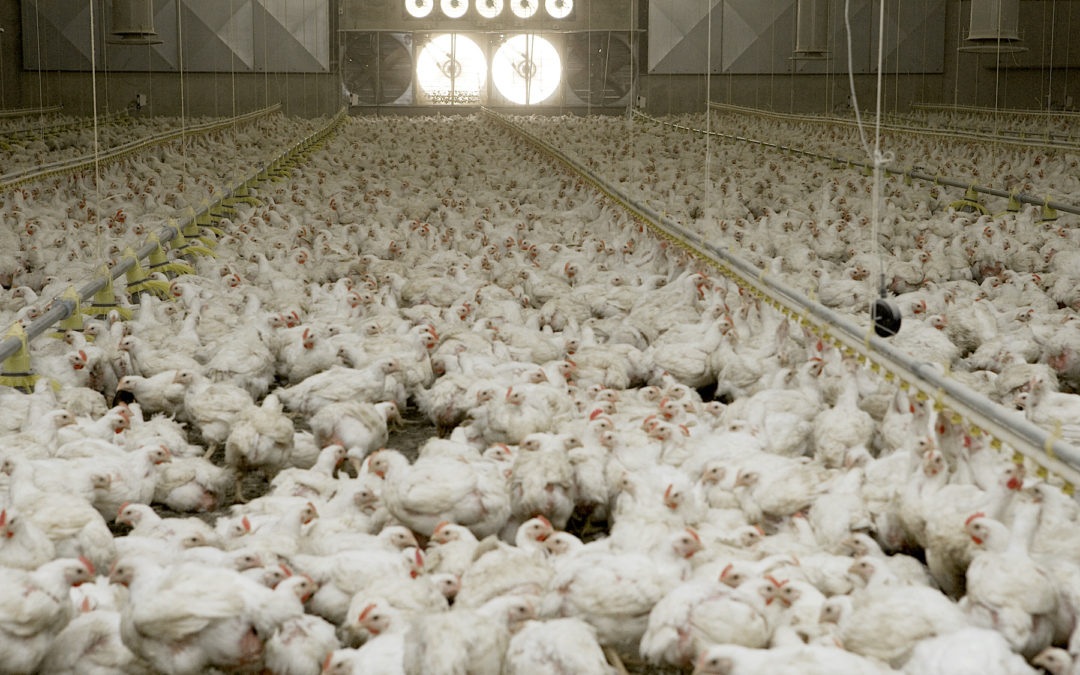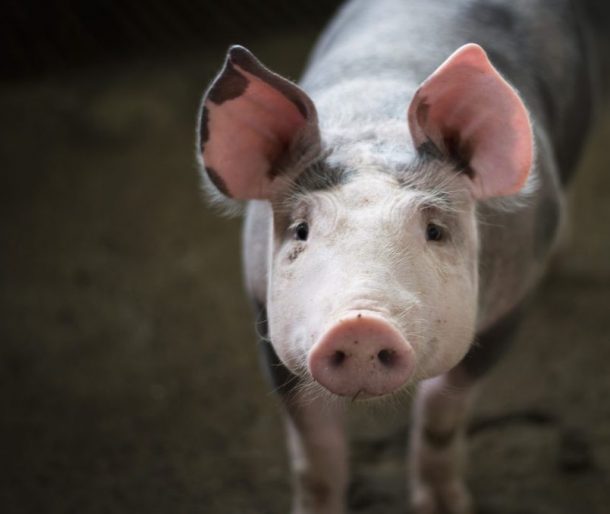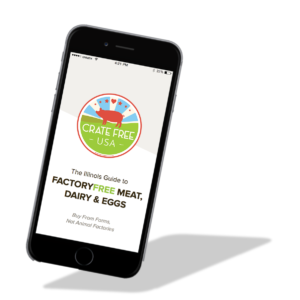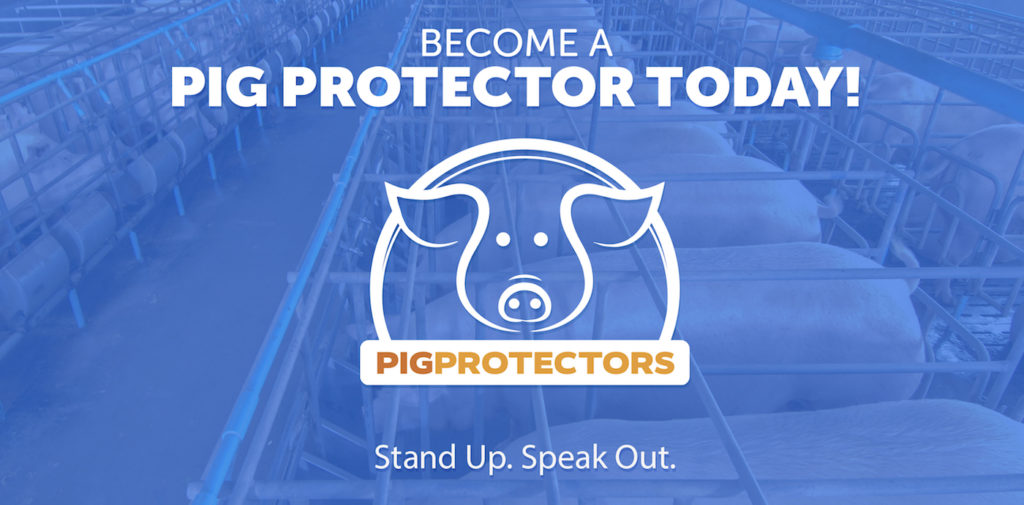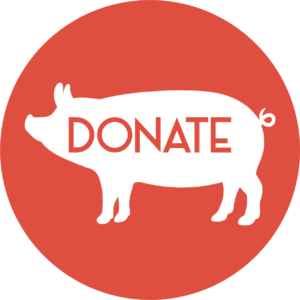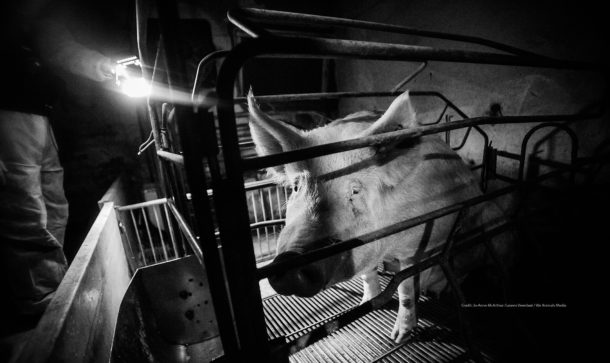Is Aldi US intentionally deceiving its customers about animal welfare? Or, did Aldi itself get tricked by a poultry producer’s new, little green label touting “Responsible Animal Care?”
Now that the secret is out, will Aldi stop using the sham label?
The trick is in the label
At first glance, Aldi’s new “One Health Certified” (OHC) label looks promising. Adorning store-brand chicken since early 2020, the OHC label sports five checkboxes, including “Animal Welfare,” “Veterinary Care,” “Biosecurity,” “Environmental Impact” and “Antibiotic Restrictions.”
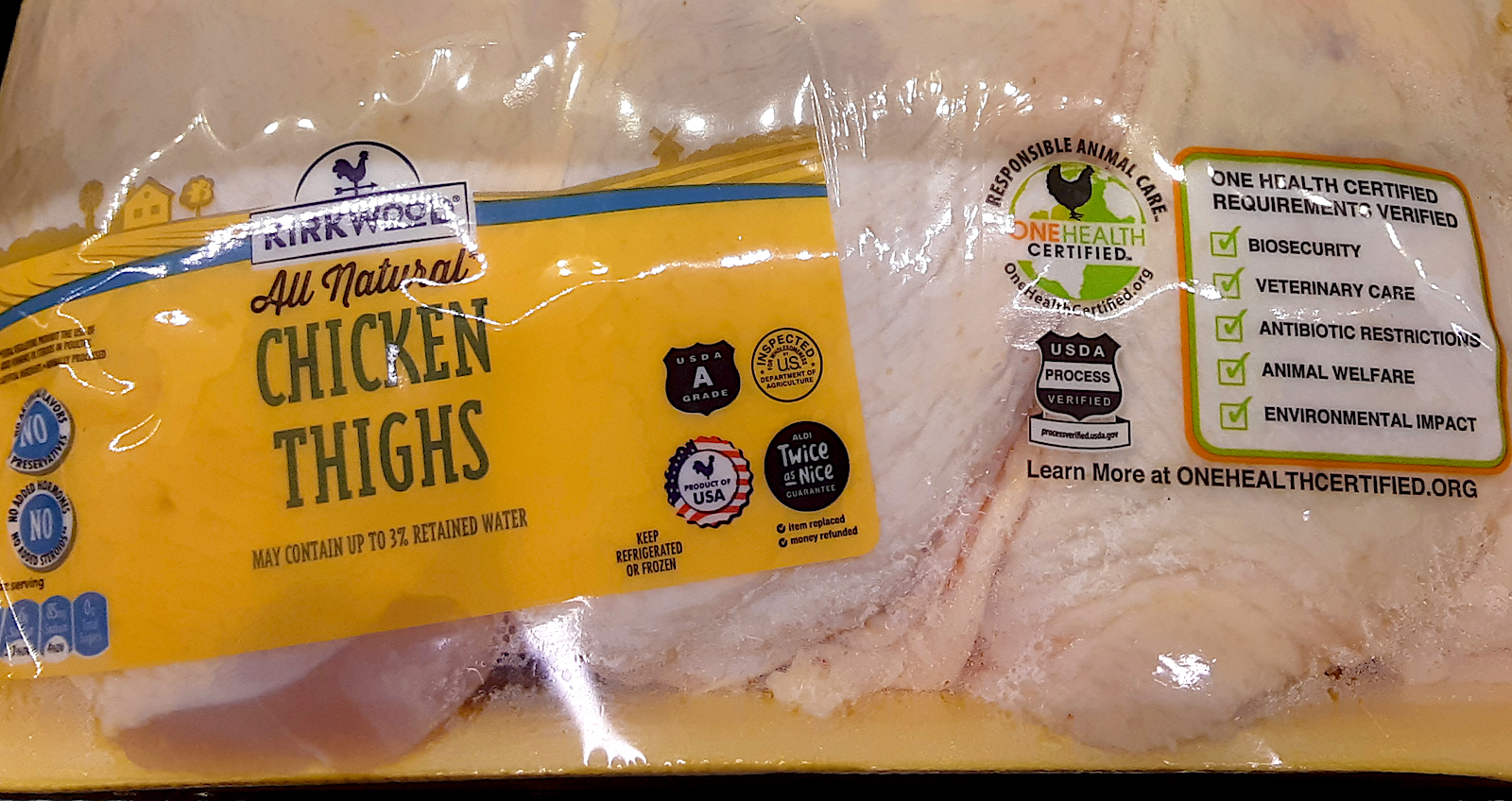
But peeling back the sticker reveals that OHC was the brainchild of Mountaire Farms: the nation’s sixth largest chicken producer, and Aldi’s chicken supplier. Mountaire created OHC to greenwash, humanewash, and healthwash its grim record of environmental violations, workers’ rights issues, and animal cruelty.
At best, Aldi got swindled by Mountaire’s deception. At worst, Aldi is playing along.
How does “One Health Certified” tarnish “One Health?”
To understand OHC, first know that there is an authentic “One Health” framework and movement embraced by the World Health Organization, the Center for Disease Control and Prevention, and others. According to the Food and Drug Administration, One Health “embraces a multisectoral and transdisciplinary approach to solving health problems by recognizing the interconnection between humans, animals, and their shared environment.” There’s even a One Health Commission that aims “to improve health outcomes and well-being of humans, animals and plants and to promote environmental resilience through a collaborative, global One Health approach.”
OHC is parasitic on the One Health movement and has nothing to do with the One Health Commission or the One Health efforts of the WHO, CDC, or FDA. OHC is just a holistic-looking label that an industrial poultry producer, Mountaire, obtained the trademark for in 2017 and simply started applying to chicken and turkey products in 2020. If you inspect OHC’s list of certified companies, you’ll see that there is just one: Mountaire, which gets packaged and sold under a variety of brand names, including Aldi’s store brand.
Mountaire is hoping OHC will repair its public image after a scathing New Yorker expose about its labor practices, a $65 million pollution settlement, and an investigation that uncovered birds being punched and sick and injured birds being discarded into piles of the dead.
But according to Brian Ronholm, the director of food policy at Consumer Reports, “this [OHC] label is essentially meaningless and should be ignored by consumers. In addition to being confusing and misleading, the label represents the equivalent of a participation trophy for normal [factory farming] operations.”
What does the OHC label actually stand for?
Animal Welfare
Far from any standards a reasonable person would associate with “One Health,” OHC celebrates factory farms that permanently confine chickens in crowded sheds until they are forcefully removed for slaughter. OHC poultry meat standards allow producers to follow the meager guidelines of the meat industry itself—the National Chicken Council (NCC). NCC merely suggests that its producers’ birds have a minimum of 0.8 square feet per bird—a space only slightly larger than a standard sheet of printer paper. No OHC birds being raised primarily for meat need be provided perches or access to the outdoors.
Even worse, OHC allows genetically modified birds bred to grow so large, so quickly, they often suffer injuries and heart and lung stress. Many can no longer walk by the time they reach slaughter age.
Environment
Simply put, as an environmental certification, OHC greenwashes. Producers are not asked to reduce their carbon footprint over time. Nor does OHC regulate other environmental hazards, like pollution or pathogens—which should not be a surprise for a label created by Mountaire, with its dismal history of environmental pollution.
Antibiotics
Despite boasting “responsible” antibiotic standards, OHC allows perpetual use of medically important antibiotics, while not alleviating the crowded, unsanitary conditions that facilitate the spread of diseases. Ongoing use of antibiotics poses a pandemic risk, and is a step down for Aldi store-brand chicken, which used to claim “No antibiotics, ever!”
Aldi’s role
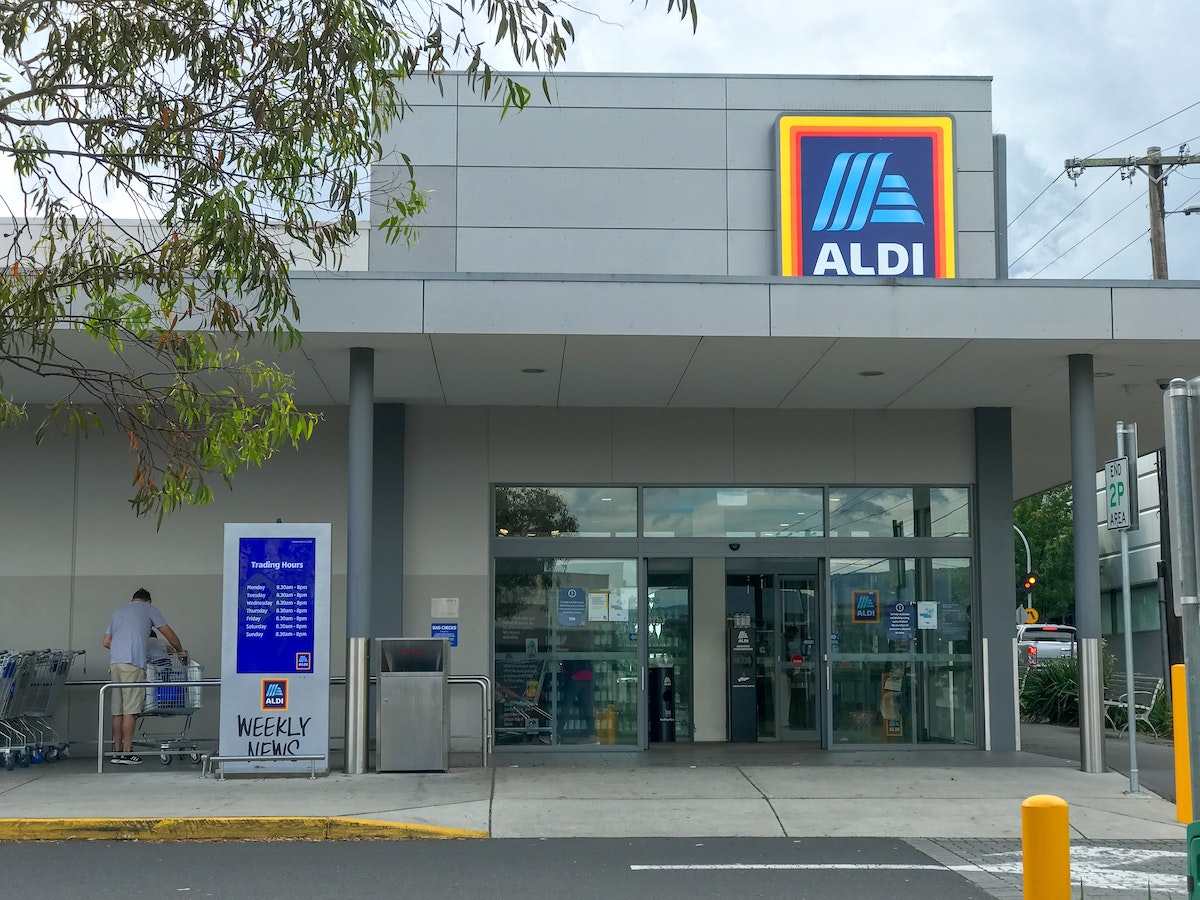
Photo credit: Marques Thomas/QuerySprout.com
Aldi’s use of the OHC label shows that Aldi knows its customers care about animal welfare, the environment, and antibiotic use. And Aldi claims to be “committed to the highest standards of responsible behavior and integrity in all [its] relationships with customers, business partners and authorities,” stating that animals in its supply chain should be free to “express innate behavior.” Yet as Crate Free USA has revealed, Aldi refuses to require its suppliers to make the bare-bones animal welfare improvement of eliminating gestation crates for pigs. A little green sticker can not wash away this failure to make a genuine supply chain improvement.
In a 2020 webinar, Mountaire Director of Technical Marketing, G. Donald Ritter, introduced as having worked on the OHC certification, explained the marketing power of OHC: “The one thing you want a label to do is to reduce consumer concerns with buying your product.” Ritter’s argument that the label’s goal is to “reduce . . . concerns” reveals what it is not designed to do —actually require companies like Aldi to engage in the work of changing a cruel and broken system.
A diverse coalition of more than 50 environmental, public health, and animal advocacy organizations, including the Center for Food Safety, Natural Resources Defense Council, ASPCA, and the Antibiotic Resistance Action Center at the George Washington University, has condemned the legitimate-appearing OHC certification—and urges restaurants, retailers, and meat producers to steer clear of it.
As one of the nation’s largest grocery chains, and the largest retailer to use OHC, Aldi has a responsibility to its customers to stop concealing Mountaire’s dirty laundry through the OHC label—and to start making real progress.
What Can You Do?
Join the movement: Send a quick, polite message to Aldi today encouraging it to:
- Ditch the sham OHC label, and
- Make meaningful animal welfare improvements, like requiring its suppliers to eliminate gestation crates for mother pigs by a publicly announced deadline.
Please spread the word about our current campaign asking Aldi to commit to eliminating gestation crates from its supply chain like many other grocers are doing.
Author bio:
The grandson of Iowa farmers, Rev. John Millspaugh, M.Div., M.P.A. graduated from Harvard University’s Divinity School and Kennedy School in 2001 and now serves as Director of Education at Farm Forward. His award-winning justice work has focused on modern slavery, LGBTQ rights, climate justice, and farmed animal protection. John’s thoughts on social ethics have been featured in the Boston Globe, the Orange County Register, C-SPAN, and the Los Angeles Times; follow him on Twitter @johngimi.
